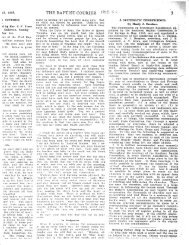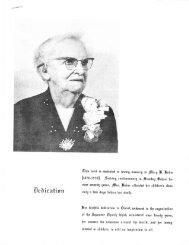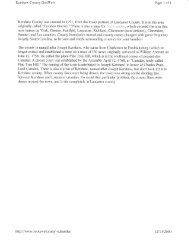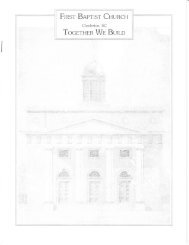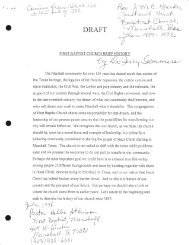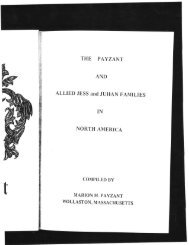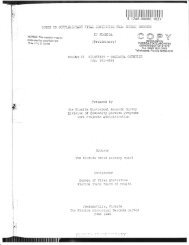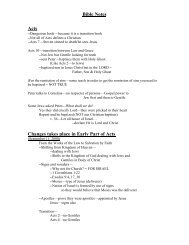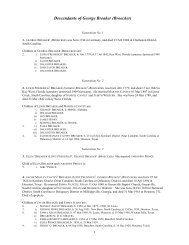Sermo vs Verbum a treatise - to see how to be born again!
Sermo vs Verbum a treatise - to see how to be born again!
Sermo vs Verbum a treatise - to see how to be born again!
You also want an ePaper? Increase the reach of your titles
YUMPU automatically turns print PDFs into web optimized ePapers that Google loves.
-t<br />
*3<br />
{'u<br />
,d,<br />
F .s<br />
€ Itr$l'<br />
B RILL<br />
<strong>Sermo</strong>: Reopening the Conversation on Translating JN 1,1<br />
Author(s): Marjorie O'Rourke Boyle<br />
Source: Vigiliae Christianae, Vol. 31, No. 3 (Sep., l97Tl, pp. 161-16S<br />
Published by: BRILL<br />
Stable URL: http:Zmw j s<strong>to</strong>r.org/stable/ I 5 83 I 29<br />
Accessed: l5/O9 / 2OlO l5:ll<br />
Your use of the JSTOR archive indicates your acceptance of JSTOR's Terms and Conditions of Use, available at<br />
http://wwwis<strong>to</strong>r.org/page/info/abouVpolicies/termsjsp. JSTOR's Terms and Conditions of Use provides, in part, that unless<br />
you have obtained prior permission, you may not download an entire issue of a joumal or multiple copies of articles, and you<br />
may use content in the JSTOR archive only for your personal, non-commercial use.<br />
Please contact the publisher regarding any further use ofthis work. Publisher contact information may <strong>be</strong> obtained at<br />
http ://www js<strong>to</strong>r.org/actior/s<strong>how</strong>Publisher ?publisherCode=bap.<br />
Each copy ofany part ofa JSTOR fansmission must contain the same copyright notice that appears on the screen or printed<br />
page of such transmission.<br />
JSTOR is a not-for-profit service that helps scholarsn researchers, and students discover, use, and build upon a wide range of<br />
content in a trusted digital archive. We use information technology and <strong>to</strong>ols <strong>to</strong> increase productivity and facilitate ne*}or1ns<br />
of scholarship. For more information about JSToR, please contact support@js<strong>to</strong>r.org.<br />
ffi<br />
EUil,<br />
http://wwwjs<strong>to</strong>r.org<br />
BNLL is collaborating with JSToR <strong>to</strong> digitize, preserve and extend access <strong>to</strong> vigiliae Christianae.
Vigiliae Christianae 31, 161-168 i @ North-Holland Publishilg Company 1977<br />
SERMO; REOPENING THE CONVERSATION ON<br />
TRANSLATING JN 1,1<br />
BI<br />
MARJORIE O'ROURKE BOYLE<br />
In the <strong>be</strong>ginning was the conversation, not the word.<br />
From Tertullian <strong>to</strong> Th6odore de Bdze extends a tradition of translating<br />
l,6yo6 in Jn 1,1 as sermo, a tradition now forgotten even by cura<strong>to</strong>rs of<br />
antique words. Only when Erasmus res<strong>to</strong>red the variant in his second<br />
edition of the New Testament (1519), and defended it with a battery of<br />
philological and patristic arguments, did the translation incite public<br />
debate.l With the Tridentine sanction of the Vulgate's yerbum, <strong>how</strong>ever,<br />
the impetus for the tradition of sermo ceased. And although, fortified by<br />
Calvin's commentary on John, Bdze translated )r.6yo6 as sermo in his NT<br />
editions,z the proliferation of vernacular Bibles among Protestants soon<br />
submerged the philological and theological issue.<br />
It deserves <strong>to</strong> <strong>be</strong> revived for scholarly examination. <strong>Sermo</strong> is the most<br />
ancient extant Latin translation for l,6yoq in the Johannine prologue. It<br />
conserves faith's witness <strong>to</strong> Christ the eloquent discourse of God, a<br />
witness his<strong>to</strong>rically diminished by the truth which the translation verbum<br />
served. And for contemporary philosophies and scientific linguistics<br />
which.recognize meaning in the sentence, not the word, it may make <strong>be</strong>tter<br />
sense than a theology of the word.<br />
Tertullian and Cyprian quote sermo in every citation of the opening<br />
verses of the Johannine prologue. In addition <strong>to</strong> eight quotations,s there<br />
r Erasmus, Annotationes in evangelium Joannis in Opera omnia 6 (kiden 1703l70O<br />
335A-337C; Apologia de "In principio erat sermo', LB 9, lllB-122E. The Leiden<br />
edition is abbreviated LB. "<strong>Sermo</strong>", the first chapter of my book Erasmus on Theological<br />
Method (Toron<strong>to</strong> in press) is entirely devoted <strong>to</strong> documentation and analysis of this.<br />
I thank the Uuiversity of Toron<strong>to</strong> Press for permission <strong>to</strong> rework this here.<br />
I Biblia sacra; sive, Testamentum vetus ab Im. Tremellio et Ft. Junio ex Hebraeo<br />
Latine redditum, et Testamentt novum a Theod. Beza d Graeco in Latint ver3<br />
(London 1650. See Calvin, In evangelium foannis,l,l, in: Opera quae supersunt omnia<br />
47 @runsvigiae 1863).<br />
8 Tertullian, Adv. Herm.?fi,4; Adv. Prax,7,8;8,4:12,6;13,3; 16,1 ;19,6;21,1. fa
lL"oo *f}<br />
".it<br />
,,:q0<br />
l{'"<br />
,.(EJ<br />
J,1'<br />
bo'<br />
162 I(b|-<br />
.2.D<br />
fl<br />
t,Strn ^'"^V f"<br />
'u..tl,rY<br />
> MARIoRIE o'RouRKE "o"l-u W<br />
/<br />
is Tertullian's valuable, impartial testimgnpid Adversus Praxean that the<br />
cus<strong>to</strong>m of Latin Christians was <strong>to</strong> rcad\In principio erat sermo, although<br />
he preferred ratio <strong>to</strong> sermo.a Cyprian\wice quotes Jn l,l in Adversus<br />
Iudaeos ad Quirinum as In principio fuit sermo, et sermo erat apud Deum,<br />
et Deus erat sermo.s He also interprets sermo as Christ in three psalm<br />
verses and a passage from the Book of Revelation.G Cyprian is acknowledged<br />
a superior source of the Old Latin Bible <strong>be</strong>cause of his antiquity<br />
and <strong>be</strong>cause he repeats almost one-ninth of the New Testament. But<br />
if the modern theory of dual North African and European sources for<br />
the Old Latin Bible? is correct, then sermo in Tertullian and Cyprian<br />
may only demonstrate the former tradition. No European patristic<br />
writings in Latin contemporaneous with Tertullian survive for comparison.<br />
<strong>Sermo</strong> remains then the earliest extant Latin translation of l"6yoq in<br />
Jn 1,1 and on Tertullian's word the reading commonly circulated.<br />
<strong>Verbum</strong> first occurs as a translation for 1"6yog in Jn 1,1 in Novatian's<br />
tract on the Trinity, but he reports sermo also.8 After Novatian this<br />
ambivalence about sermo and verbum disappears until Auggsline revives<br />
it. gltu,Ly nine times cites the opening verses of the Johannine prologue<br />
and in every instance l,oyog is translated as verbum.s By the fourth<br />
century verbum is universally preferred in the West. Eusebius Vercellensis'<br />
<strong>treatise</strong> on the Trinity quotes verbum in every citation of the prologue.l0<br />
His evidence is important, not only <strong>be</strong>cause he may have transmitted the<br />
oldest European version of the Gospels, preserved in the codex Vercellensis<br />
(a),rl but <strong>be</strong>cause he prefixes his citations of the verse with the explicit<br />
phrase 'oas it is written". Isaac Judaeus, in his exposition on the gg4glit<br />
faith at about the same time, also quotes verbuminthe prologue, preceded<br />
by "thus it is said".rz Zeno Veronensis reports verbum;13 so does Maximus<br />
a Tert. Adv. Prax.5,3.<br />
6 Cyprian, Adv. Iud.2,3;2,6.<br />
o Cypr. Adv. lud.2,3.<br />
? For a complete list of Old Latin Bible MSS. <strong>see</strong> Vetus Latina, ed. Bonifatius<br />
Fischer, l, Verzeiclnis der Sigel (Freiburg 1949).<br />
8 Novatian, De trin.l3,1; 15,6; 21,3; 30,16.<br />
e Hilary, De trin,l,l0;2,12;2,23; 12,9; 12,56; De Syn, 24;29; 69i Tract. in ps.<br />
122,7.<br />
ro Eusebius Vercellensis, De trin.3,46; 5,?.O: 5,22.<br />
r,fl-1; " Bruce Metzger, The Text of the New Testamenr (Oxford ,1968) 23.<br />
t<br />
- rs Isaac Judaeus, Exp. fid. cath., CC, ser. 1at.,9,347.<br />
13 Zeno Veronensis, Tract. 2,8; 2,3.<br />
,ro A f/'F-<br />
- ^a,f g lt 'E<br />
t6@
7<br />
oN TRANSLATTNG JN I,l 163<br />
of Turin.la The authoritative Ambrose crtes'verbumin eighteen quotations<br />
of the prologue, attributed twice as "I read" and "he read".l5<br />
Meanwhile, <strong>how</strong> did the churches in Africa read the verse? Lactantius<br />
quotes verbum as the translation for l,6yoq in Jn l,l, but in the context<br />
of his demonstration that l,61oq means sermo or ratio.r& Arnobius does<br />
not record the verse,u while Marius Vic<strong>to</strong>rinus preserves the Greek l.6yoq<br />
throughout his Latin hymns on the Trinity.ls<br />
The tradition of sermo as a translation for l,61oq in Jn l,l surfaces<br />
<strong>again</strong>with Augustine's stttement of two manuscript tradi$JrJrs, one which<br />
_tgnscri<strong>be</strong>d sermo attd the othpr, verbuln. Exegeting Jn 17,18, he explains<br />
that the Greek gospel has l,6yoq, which word also occurs in Jn l,l. While<br />
the Greek always has l,6yog, he continues,<br />
llre Latin co4i.c<br />
vefuu-ae:glro. While some versions have In principio erat verbum<br />
and <strong>Verbum</strong> tuum veritas esf, others have In principio g-Ig!^[gIWg. and<br />
<strong>Sermo</strong> tuus veritas esf. Both mean God's Word, his only-<strong>be</strong>gotten,<br />
Augustine decides.re O,.thgr p4sqqqq in Arlguqtine aFFlies .rprrna<br />
^ <strong>to</strong> 9htt_rt in the ggqpetg hg_pT!rysrgg,g =IFbstantiate il_qlg _l3ttlirtsl_iteratnre,<br />
his tnqwledge_gfugn q_Qta Cbrlslfat!rygqla!_b_g.f_oI l6y,sS.39<br />
; N"rth Africa, Augustine may have <strong>be</strong>en privifegeO io codices<br />
""tt"r<br />
of<br />
"f<br />
a regional tradition.<br />
Perhaps Jerome was orant of sermo as a traditional tra<br />
)',6yoq in Jn 1,1. Without leaving an explanation,zl he chose verbum, a<br />
decision which as<strong>to</strong>nished Erasmus.22 \<br />
Although the Fathers sometimes used the words interchangeably,<br />
sermo and verbum are not synonymous. They may even <strong>be</strong> regarded as<br />
an<strong>to</strong>nyms. <strong>Verbum</strong> may <strong>be</strong> argued a grammaticallv inacpurate, at least<br />
llappropriate, ! A0y_qq!rrJu*l,l_<br />
Among its denotations l,61oq means speech: a continuous statement,<br />
narrative, oration; verbal expression or utterance; a particular utterance<br />
14 Maximus Taurinensis, <strong>Sermo</strong> 39a extr.3; <strong>Sermo</strong> 51,2; <strong>Sermo</strong> 64,2; <strong>Sermo</strong> llD<br />
exff.2.<br />
r5 Ambrose, Hex. 1,5i De par.5; De Is.5; De interp,l,9;4,4; Exp. Ps.117,14,23:<br />
Defidel,8;1,19;2,2;5,li5,9iDespir.sanc.1,l1;1,15; Epist.ll;Tract.inevang.Lac.<br />
1,3;2,40; l0,ll8.<br />
10 Lactantius, De Yera Sap. et Re|.,4,8-9.<br />
r7 Arnobius, Adv. nat.<br />
18 Marius Vic<strong>to</strong>rinus, De tin, hym.,PL 8, l14l ; ll42;1141.<br />
re Augustine, In loan. evang. tract,108.<br />
80 Aug. In loan. evang. tract.54; Enn. in Ps.147,22.<br />
2r Cf. Jerome, Hom. in loann. evang., PLS 2, 183-188.<br />
22 Erasmus, Apologia de "In principio erat sermo", LB 9, I l3E.
164<br />
MARJoRIE o'RouRKE BoYLE<br />
or saying; expression, utterance, speech regarded formally. Both the NT<br />
and Greek patristic literature employ these meanings. Even in the classical<br />
lexicon, where other meanings were more significant, l,61oq signified a<br />
phrase, complex term, sentence, or complete statement, in opposition<br />
<strong>to</strong> a discrete word (verbum).It was a continuous statement such as a fable,<br />
legend, s<strong>to</strong>ry, or speech delivered in court of assembly. Rarely meaning a<br />
single word, 1.6yog could never signify grammatically a vocable (6noq,<br />
l.6lt6,6vopa, Fflpa)."<br />
Oratio is the Latin counterpart of this denotation of l,6yoq, as at least<br />
Erasmus knew, although he rejected it <strong>be</strong>cause of its gender.za The sense<br />
of colloquial familiarity which sermo has does not match the formality<br />
of )u6To6, although the Fathers preferred it <strong>to</strong> oratio. Of sermo Varro<br />
wrote: "<strong>Sermo</strong> 'conversation', I think, is from series 'succession' ... for<br />
sermo'conversation' cannOt <strong>be</strong> where one man is alone, but where his<br />
speech (orattQ is joined with another."Z5 <strong>Sermo</strong> signifies a literary<br />
conversation, discourse, disputation or discussion that is more informal<br />
and unpretending than oratio, <strong>Sermo</strong> means ordinary speech, speaking,<br />
talking and the langUage of conversation, as opposed <strong>to</strong> contentla. It also<br />
refers <strong>to</strong> national <strong>to</strong>ngues. Literarily it is used of satiric verses in a<br />
conversational style, as in Horace. <strong>Sermo</strong> is also common talk, synonymous<br />
with report or rumor, and extends in that meaning <strong>to</strong> slander and<br />
calumny.26 During the fourth sermo <strong>be</strong>came the Christian term<br />
2t f6Tog, A Greek-English Lexicon, ed. Henry G. Liddell and Ro<strong>be</strong>rt Scott, rev.<br />
Henry S. Jones and Roderick McKenzie, 2 (Oxford 01940) 1058-1059; L6yoq, The<br />
Vocabulary of the Greek Testament, ed. James H. Moul<strong>to</strong>n and George Milligan<br />
(London 1930) 379; l,6yo€, A Greek-English Lexicon of the New Testament and Other<br />
Early Christian Literature, eA. William F. Arndt and F. Wilbur Gingrich (Cambridge<br />
1957) 478-480 ; ?'6Tcrr, ?',6ToC, pfipc, ?ucl"6co , Theological Dictionary of the New Testament,<br />
ed. Gerhard Kittel, trans. and ed, Geoffrey W. Bromiley, 4 (Grand Rapids 196?)<br />
69-143; ?',61o9, A Patristic Greek Lexicon, ed. G.W.H. Lampe, 1 (Oxford 196l)<br />
807-811.<br />
u Erasmus, Annotationes in Evangelium Joaruis LB 6, 335C; Apologia de *In<br />
principio erat sermo", LB 9, 114A. In "Oratio", the second chapter of Erasmus on<br />
Theological Method,I trace the development in medieval grammar of the confusion<br />
of natural and grammatical genders and suggest Erasmus' dependence on it in this case.<br />
25 Marcus Terentius Varro, De 1il9.1at.6,64.<br />
so sermo, A Latin Dictiotury, ed. Charle<strong>to</strong>n F. Lewis and Charles Short (Oxford<br />
1879) 1679', sermo, Totius Latinitatis Lexicon, ed. Aegidio Forcellini, 4 (Prati 1&15) 138 ;<br />
sertno, Dictionrnire itymologique de Ia langue latine, ed. A. Ernout and A. Meillet<br />
(Paris 11959) 617; sermo, The Oxford Classical Dictiorary,ed. N.G.L. Hammond and<br />
H.H. Scullard (Oxford s1970) 979. Cf. Dominus du Cange, Glossarium mediae et
ON TRANSLATnIG JN 1,1 165<br />
<strong>Verbum</strong>is grammatically the single word, abstracted from the discourse<br />
which sermo means and its implied context of an audience. <strong>Verbum</strong> means<br />
one word. To gain the sense of speech ()v61og) it must <strong>be</strong> pluralized, as<br />
in verba facere and other idiomatic expressions. In the singular its<br />
meaning may extend <strong>to</strong> a sententia, but this usage is ante-classical. The<br />
widest range of speech which verbum properly includes is a proverb. In<br />
grammaticat partan@he Greek counterpaft of verbum<br />
is not h6yog but 1.6[tg, precisely a vocable that<br />
Although from Jerome's redaction until Erasmus' the translation of<br />
?v6yog in Jn I ,1 came <strong>to</strong> <strong>be</strong> transmitted as verbum, Anselm of CanterburY,ze<br />
Remigius,so Hugh of St. Cher,sr Nicolas of Lyra,3z Thomas Aquinasss<br />
and the glossa ordinarida all interpret biblical occuranc€s of sertno as<br />
Christ. Exegeting Heb.4,l2, for example, Thomas Aquinas refers sermo<br />
<strong>to</strong> the Son of God. "Considered in itself," he writes, "that word lsermo)<br />
<strong>see</strong>ms <strong>to</strong> present a difficulty, but if we consider another translation the<br />
meaning is plainer. For where we have sermo, in Greek it is l,6yog, which<br />
is the same as verbum; whence sermo, i.e. verbum."86<br />
Did the translation of verbum for )',61o9 in Jn l,l originate in lexical<br />
chance or in a theological apology? This is impossible <strong>to</strong> establish on the<br />
infimae latinitatis 7 (Paris 1938) 438; J.-P. Migne, Lexicon mouale ad scrip<strong>to</strong>res<br />
mediae et infimae latinitatis (Paris 1890) 2046.<br />
s? Christine Mohrmann, Praedicarotractare-sermo, in: Etudes sur le latin des<br />
chrAtiens 2 (Rome 1958-1965) 71.<br />
88 verbum, A Latin Dictiorury, ed. lrwis and Short, 1972; verbum, Totius l-atinitatis<br />
I*xicon, ed. Forcellini,618. See n.23.<br />
2e According <strong>to</strong> Erasmus,ApoWlgJkl'In_ptincipio erat serryo-,I,l!-2)t JltrS :<br />
although I havJso far <strong>be</strong>en unm;l; the dAerncriticat<br />
edition of Anselm of Canterbury, Opera omnia, ed. Franciscus Salesius Schmitt, l-2<br />
(Segovia 1938-19,m) and 3-6 (Edinbureh l94ill96t).<br />
30 Remigius of Auxerre, Expositio in Epis<strong>to</strong>lam ad Hebraeos, in: Commentariw<br />
in Epis<strong>to</strong>las S. Pauli PL 117, 849C, 849D, 850C, 8518. In this edition the work is<br />
wronglyattributed<strong>to</strong> Haymo of Falversham. See M. Manitius, Geschichte der lateinischen<br />
Literatur des Mittelalters 1 (Munich 1911) 51G517.<br />
31 Hugh of St. Cher, Opera omnia in universum vetus, et novum testamentum 7<br />
(Venice 1732')?r'r6L-D.<br />
3r Nicolas of Lyra, Biblia sacra cum glossa ordinaria, ed. Strabo Fuldensis, 6<br />
(Paris 1590) 835-836.<br />
88 Thomas Aquinas, In Epis<strong>to</strong>lam ad Hebreos, inz Opera omnia 13 (New York 1949)<br />
705.<br />
84 Glossa ordiruriaPL 114,6514; PL 113, 1180D. The authorship is mistakenly<br />
attributed in this edition <strong>to</strong> Walafrid Strabq whereas it is the work of Anselm of I-aon<br />
and others.<br />
86 See n. 33.
t66 MARJORIE O'ROURKE BOYLE<br />
evidence, difficult <strong>to</strong> assess. But there appears <strong>to</strong> <strong>be</strong> in Latin patristic<br />
thought, and this is speculation on a rationale for verbum, a fusion or<br />
r go]r$qion . qfjhe doctrine of Qh{is1__qs_{qlglglig!Lg:9Jl- and as the<br />
only-<strong>be</strong>gotten (povoyevtg) so that one Son has <strong>be</strong>en conceptualized as<br />
one Word.<br />
Trinitarian definitions of the Son's distinction from the Father reflected<br />
Christian <strong>be</strong>lief in the sufficiency of Christ's mediation in the divine<br />
economy. Tertullian first claimed that the Persons of the Trinity are<br />
numerically distinct, although inseparable, and thus "capable of <strong>be</strong>ing<br />
counted".36 But it was Augustine who, in his exegesis of Jn l,l, equated<br />
one son and one word. To the_ leliever's inquiring mind he wished <strong>to</strong><br />
disclose a son who was trt.(ltfbsingle generation of the Father. He<br />
wrote, *rhen in the text that follows: 'And the word was with God,' ther<br />
word is certainly unders<strong>to</strong>od <strong>to</strong> <strong>be</strong> the son alone, and not the Father \<br />
and the Son <strong>to</strong>gether as though both were the one Word."3? Again, in \<br />
the interpretation of Jn t7,18 cited above he harmonized the only- ,./<br />
<strong>be</strong>gotten Son with verbum.88 /<br />
Concerned <strong>to</strong> distinguish God's Persons <strong>again</strong>st the Modalistic claims<br />
of Sa<strong>be</strong>llius and others, Augustine's argument lapsed in<strong>to</strong> a problematic<br />
computation which he inherited from his adversaries. Whereas he might<br />
have argued that the one Son is one oration, he unders<strong>to</strong>od the Son as<br />
the word, the Father's single undivided utterance. would oratio or sermo<br />
have compromised the only-<strong>be</strong>gotten son any more than the unity of a<br />
discourse is compromised by its composition from many words? A<br />
brilliant rhe<strong>to</strong>r, Augustine did not develop a theology of the son as<br />
copious discourse ()'6yoq), the Father's full and eloquent oration.Be<br />
Despite his modesty about his speculation on the Trinity, his partial<br />
perspective on the mystery of the l6yog was wholly adopted.<br />
In Augustine's debt in the eleventh century, Anselm of Canterbury<br />
was still explaining that "this expression [of God] does not consist of more<br />
words than one, but is one word". God's expression must <strong>be</strong> consubstantial<br />
with his nature, Anselm argues, <strong>be</strong>cause the unity and indivisibility<br />
of the supreme spirit dictate this. "For, if it is so consubstantial with the<br />
80 Tert. Adv. Prax.2,4.<br />
s? Aug. De trin.6,2.<br />
88 See n. 19.<br />
8e Kenneth Burke reads in Augustine's conversion an attachment <strong>to</strong> the single Word<br />
in deli<strong>be</strong>rate repudiation of his career as a rhe<strong>to</strong>r, a salesman of many words, in<br />
The Rhe<strong>to</strong>ric of Religion (Bos<strong>to</strong>n 196l) ll4.
oN TRANSLATINC JN I,l<br />
supreme nature that they are not two spirits, but one; assuredly, just as<br />
the latter is supremely simple, so is the former. It therefore does not<br />
consist of more words than one, but is one Word, through which all things<br />
were created."4o The father of scholastic method recognized no grammatical<br />
inconsistency in terming the divine [6yog locutio, then claiming that<br />
ttis locutio consists of one, single word. Aquinas refined the confusion<br />
by arguing that <strong>be</strong>cause God understands himself and all creation by one<br />
act, only one Word is <strong>be</strong>gotten. His doctrine of verbum does include<br />
<strong>be</strong>lief in the Son as the Father's revealing conversation with all creatures,al<br />
ice of the term<br />
Adding <strong>to</strong> the diminishment of sermo was the theory of the verbum<br />
abbreviaturn which also formulated patristic and medieval faith in the<br />
sufficiency of Christ. Often appearing in apologies <strong>again</strong>st the "perfidy"<br />
of the Jews, is the argument that Jesus is an abridged word. The many<br />
words of the Hebrew authors have yielded <strong>to</strong> the one Word, Christ, in<br />
whom the entire Scripture converges uniquely. Theologians appealed <strong>to</strong><br />
Rom 9,28, "An abbreviated word God spoke upon the earth."ag<br />
If the patristic choice of verbum as a translation for ?r6yoq in Jn 1,1 was<br />
accidental, and not intended <strong>to</strong> support the theology sketched above, it<br />
served that end eventually. For Erasmus, editing the first Greek and Latin<br />
edition of the New Testament,as this semanticjqdlsgr@ of the early<br />
Church diminished its faithful testimony <strong>to</strong> Christ as thg*f?r!95 ggl11-q$<br />
<strong>to</strong>ln.n. "<br />
,oration<br />
-rys'Sf ygg&n! j991gle?qelrs!g@:'ry!,:gW!yr_8un_doss.<br />
{gtglPJelg speech as a wholelut olrgffLqgglar saying. But Christ is for<br />
this reI$n iatled royog: <strong>be</strong>cause;hatsoevfmFffiilrp.aks, he speaks<br />
through the Son."aa Because the ?',6yog is the Father's copious discourse,<br />
his sufficient revealing oration, verbum (one word) is inadequate <strong>to</strong><br />
-5lqq[lge-sgwith humanist conGrn6i<br />
and reality (Cicero's verba et res) and with humanist revival of divine con-<br />
d0 Anselm, Monologion, inz Opera omnia, ed. Schmitt, 1,30. Cf. Epis<strong>to</strong>la de incamatione<br />
verbi, in: Opera omnia 2, 10.<br />
41 Aquinas, ^9T l, q. 34, art.1,2,3.<br />
42 Henri de Lubac, Exdgdse midiivale 3 (Paris 1959-1964) lB7-197.<br />
48 Published by Johannes Fro<strong>be</strong>n (Basel 151Q. The NT of the comprutensian<br />
Polyglot Bible was prepared for press already in 1514, but was not published until<br />
1520, papal approval pending.<br />
41 Erasmus, Annotationes in Evangelium Joannis LB 6, 335C; cf. 335A,8 and<br />
Apologia de "In principio erat sermo", LB 9, l2lD, 122D.<br />
167<br />
'
168 MARJoRTE o'RouRKE rf,<br />
versation as a paradigm for men, Erasmuseslgtl{r-fo}riefly <strong>again</strong>.as<br />
Augustine, Anselm and Aquinas might have objected that sermo,<br />
meaning a discourse or conversation composed of many words, jeopardizes<br />
faith in the simplicity of the Father's utterance, the only-<strong>be</strong>gotten<br />
Son. Qne can qheqqe- vzrir{aa for this apologetical reason, <strong>to</strong> safeguard<br />
the simplicity of the Father's generative act, and <strong>to</strong> serve<br />
&gg!gg. Qr one calg the<br />
Greek New Teslansnllfuithfully, and restrict its<br />
.._ti*. j[bich compromise is <strong>be</strong>tter? The implications for theological<br />
method are substantial.<br />
<strong>Verbum</strong> or sermo? If, as Augustine argued seminally in De trinitate,<br />
<strong>be</strong>lievers may glimpse Christ by examining the human experience of<br />
speaking,ao then verbum <strong>see</strong>ms an appropriate analogy as long as men<br />
dictate that the is the basic unit of<br />
and meaning, the computation of such signs.az Scientific linguistics <strong>to</strong>day<br />
asserts the primacy of syntax over semantics, led by the demonstration of<br />
Noam Chomsky's transformational grammar that the Pla<strong>to</strong>nic appeal <strong>to</strong><br />
morphemes as the basis of meaning is meaningless.as As the perception of<br />
language shifts, a theology of the word (verbum) may <strong>be</strong>come anachronistic<br />
and the ancient witness <strong>to</strong> Christ as discourse (sermo), timely<br />
<strong>again</strong>.ae<br />
In his acclaimed analysis of the doctrine of the Word, Bernard Lonergan<br />
assumes that verbumwas the traditional translation for ?',6yog in the Latin<br />
Church <strong>be</strong>fore Augustine.uo<br />
Beggvg 99ll-gly*e$icllPpreciation<br />
of the mystery of Christ as the )'61oq. What sort of theodgy rnigtiteffirge<br />
from this paradigm?<br />
Toron<strong>to</strong>,27 Gamble Avenue #201<br />
4t See my Erasmus on Theological Method,<br />
46 Aug De trin.9,7*9;15,11; 15,15; De doctr. chr, 1,8;2,14.<br />
47 Pla<strong>to</strong>, Crat.42lD-427D.<br />
48 Noam Chomsky, Syntactic Structures (The Hague 1960. Cf. Maurice Merleau-<br />
Ponty, Signes (Paris 1960) and Ferdinand de Saussure, Cours de linguhtique genirale,<br />
ed. Rudolf Engler (Wiesbaden 1967-1968); Ludwig Wittgenstein, Philosophical<br />
Investigations; Philosophische Untersuchungen, trans. G.E. M.Anscom<strong>be</strong> (Oxford1963).<br />
40 The author expects <strong>to</strong> develop this in a journal of speculative theology.<br />
60 Bernard Lonergan, Verbam, ed. David B. Burrell (Notre Dame 1967) intro.<br />
duction, x.





